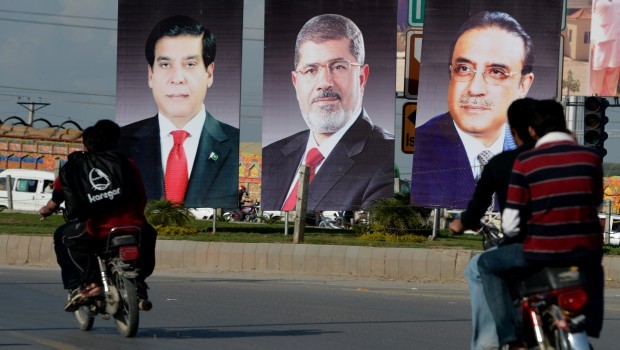
Pakistani motorcyclists ride past billboards featuring portraits of Egyptian President Mohamed Morsi (C), Pakistani President Asif Ali Zardari (R) and Prime Minister Raja Pervez Ashraf along a street in Islamabad on March 17, 2013 Source: AFP PHOTO/Aamir Qureshi
His one-day visit to Pakistan was the first of its kind by an Egyptian president since Gamal Abdel Nasser. President Anwar Sadat visited Pakistan in 1974, though this was to attend a multilateral summit.
The Egyptian president yesterday held a bilateral meeting with his Pakistani counterpart Asif Ali Zardari at Aiwan-e-Sadr palace, Islamabad. In a statement, the Egyptian presidency said that the closed-door session of talks focused on “bilateral ties and a host of regional and international issues of common interest.”
The presidency added that Mursi and Zardari “attended the signing of five memorandums of understanding on bilateral cooperation in the fields of investment, small enterprises, post services, freight and the media.”
During the talks, special attention was given to the revival of efforts for a peaceful settlement in the Middle East, and the development of the Syrian crisis. To that end, Zardari later announced that “Pakistan believes that Syria’s territorial integrity and sovereignty must be respected”. The Pakistani president added that any outside interference would only complicate the situation further, and lead to serious consequences for neighboring countries.
Later, President Mursi was awarded with an honorary doctorate in philosophy from the Pakistani National University of Science and Technology.
During his acceptance speech, Mursi emphasized the depth of relations between the two countries, stressing that Egypt will not forget Pakistan’s support in the October War of 1973. He added that in the current era the two countries have a friendship based on common factors and mutual faith, and that Egyptian-Pakistani relations are now characterized by strength, interdependence, and cooperation. On the subject of investment between the two states, Mursi revealed that the current volume of Pakistani investments in Egypt is less than USD 50 million, but that both parties are keen to increase this figure.
Mursi went on to highlight the importance of cooperation between the two countries, and between the components of the Islamic ummah in general. He stated that now is the time to restore the ummah’s leadership role, given the challenges and difficulties it is facing at the moment.
Mursi’s next stop is India, arriving today for a three-day visit, which is scheduled to include talks with India’s prime minister Manmohan Singh. In contrast to Pakistan, the economic ties between Egypt and India are extensive, and bilateral trade currently stands at USD 5.5 billion, according to the Indian government. Saeed Abdullah, the Egyptian minister of trade and industry, said that Egypt aimed to raise the figure to around USD 8 billion over the next two years.
The two countries’ leaders signed a number of economic agreements, which the Egyptian government hopes will boost investment at a time of serious and growing economic problems.
Speaking to reporters after his meeting with the Indian PM, Mursi said that he wanted Egypt to be the “hub of Indian exports to Africa.”
His Indian counterpart said that “the agreements that we have signed today are a clear manifestation of our desire to impart a new dynamism to our relationship.”
Before embarking on his south Asia tour, President Mursi left Cairo amid tempestuous circumstances. The office of the Muslim Brotherhood’s guidance bureau, located in the Mokattam district of southern Cairo, has recently been the scene of two days of violent clashes. Security sources revealed that the violence, which broke out between security forces and demonstrators opposed to the Brotherhood’s rule three days ago, came to an end Sunday after dozens had been injured, some of them seriously.
Now, Mokattam district is experiencing a state of uneasy calm. Intensive security reinforcements have been deployed to guard the Brotherhood’s bureau, while plain clothed security personnel are patrolling the district.
The clashes erupted two days after Brotherhood members attacked journalists and activists gathered in front of the guidance bureau, after some had attempted to vandalize the building with anti-Brotherhood graffiti.
Yesterday, the Egyptian public prosecutor ordered the arrest of three of Khairat El-Shater’s personal guards, accused of being involved in the violence. The Mokattam district prosecutor also ordered the imprisonment of 15 defendants for 4 days pending further investigations, under charges of damaging public and private property, attacking the security forces, possessing knives and Molotov cocktails, and intimidating local residents.
Meanwhile, hundreds of demonstrators gathered in front of the headquarters of the high court in central Cairo yesterday demanding the downfall of the regime and the Muslim Brotherhood, which they described as illegitimate.
A number of members of the Shura Council are also believed to hold Dr. Mohammed Badie—the Muslim Brotherhood’s General Guide—legally responsible for the events outside the guidance bureau. MP Salah al-Sayegh, a member of the Shura Council’s Information and Cultural Committee, said, “The attack confirms that we are not living in a state, we are living in absurd circumstances. Amid these circumstances, the general guide of the Brotherhood has secured a position higher than that of the president, and he has the final say”. Sayegh holds Badie responsible for the harassment of journalists and activists in front of the guidance bureau, saying, “Everything that happened there came with his orders and knowledge.”

Trackbacks/Pingbacks